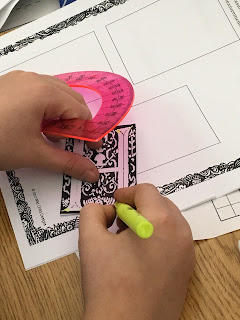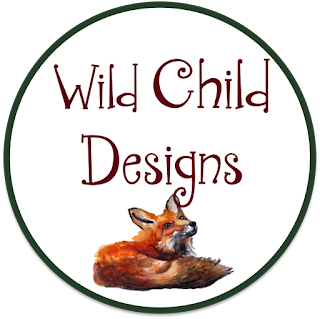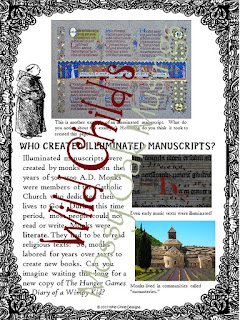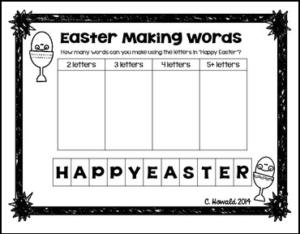It’s Teacher Talk’s Featured Author
March 2017
Tracy Willis
of
I’ve been teaching for 24 years, and I still love exploring new approaches to learning and teaching. My favorite approaches include using art, music, and movement in my lessons. My products reflect the marriage of academics and the arts. I chose my store name because I am a “wild child.” I love animals, trail running, and hiking…anything to do with nature. My favorite thing about teaching is experiencing that moment when a student loses herself in her learning, forgetting to be resistant. There’s nothing better than, “What are we going to do next, Ms. Willis?”
My best selling product came about because I was looking for a way to excite and challenge my students while teaching fractions, decimals & percents. You can find it here (click):
(Click the picture!)
In this math and art project, inspired by Piet Mondrian’s art, we view his art and question the amounts of colors in examples. We measure the amounts using a transparent overlay, and then figure out the fractional, decimal and percentage amounts of each color. Students then create their own Mondrian-inspired art using mathematical parameters. There are also reading and writing components to it, too!
My favorite product is one of my newest. Check it out below!
(Click the picture)
This is another math, art and literacy project. In this product we learn about Kandinsky and synesthesia, which fascinates my students. Using critical thinking strategies, students view a color study by Kandinsky, explore circumference, and creative problem solving before collaging their own Kandinsky-inspired artwork.
My favorite thing about writing for TBOTEMC’s Teacher Talk is the virtual collaboration. It’s exciting to read about other teachers’ classroom journeys. It’s exciting to be a part of that conversation, too!
Places you can find me…
You can check out my most recent blogpost below!
Go down deep enough into anything and you will find mathematics.
Dean Schlicter
There was a time in my life when this quote would’ve terrorized my whole existence (insert traumatized laugh). I remember fifth grade like it was yesterday, because that was the beginning of my obsession with history and my loathing of math. That year, I read every book I could find about the medieval time period. My imagination blossomed with tales of knights and the bubonic plague. And at night, I was tormented with nightmares of rogue long division problems. And now as a fifth grade teacher, when I think of math, it conjures up images of King Arthur, Merlin, death and destruction and the sounds of Gregorian chant. I can’t help but wonder what my classroom math experiences might have been had my teacher linked the math to something that I love—like medieval history.

One awesome thing about being a teacher is that you get to right the wrongs you may have experienced yourself as a learner. That’s what I did. I took my students’ angst about classifying and measuring angles and I turned it into a math and art project, as I wished my fifth grade math teacher had done.
We began by reading about illuminated texts. I brought this part of the project into my reader’s workshop and used it as a center. Students read a three page history about illuminated manuscripts and completed a close read. This worked really well, and I was able to extend it into a lesson on nonfiction text structures.
After reading about illuminated texts and the history of monograms, I gave my kids copies of medieval lettering. They cut out their monograms from these letters and glued them onto another page to examine them more closely. Together, we explored the angles in each of our letters. Using highlighters, my students began highlighting the angles they found in their letters. Reviewing acute, obtuse, right and straight angels, as well as supplementary and complementary angles, we began to sort our letters according to their “angle traits.” We did this in small groups. At first, we eyeballed the angles and then used protractors to measure them.




The last part of this math project was great fun. We closely examined a close up photo of a real illuminated manuscript. I was able to blow this up on my SMART board using the pdf I had created of the photo. We completed a visible thinking routine called “See-Think-Wonder.” Students named and noticed the types of pictures painted in around the illuminated letters.
I created an illuminated alphabet using some fantastic gold glitter lettering from Paula Kim Studios. After printing it on cardstock paper, my kids selected their first or last initial and began drawing in details around their gold letter. They were required to sketch in details about their lives around their illuminated letters.
After sketch was complete, we used colored pencils to fill in our drawings with vibrant colors. My students knew the colors had to be bold and vivid after looking at illuminated manuscript examples.
What are we going to do next in math, Ms. Willis?
This literacy, math and art project was fun. I teach fifth graders, so this was a review of fourth grade learning for them. It enabled us to review measurement concepts and address learning goals in other curriculum areas. After having taught fourth grade for umpteen million years, I would use this project with fourth graders as an end-of-unit alternative assessment.
Perhaps the BEST part of this learning experience was my students asking, “What are we going to do next in math, Ms. Willis?” Eyes shining. Faces smiling. No tears. Learning cemented. Not a worksheet in sight.
To check out this project for yourself, click on the graphic below. It’s all there for you…the literacy, math and art. Enjoy a SURPRISE SALE for the month of March!
You might also be interested in these math, literacy, and art projects, too!
This month, I’ve teamed up with some other teacher bloggers. Be sure to check out their posts below!
















